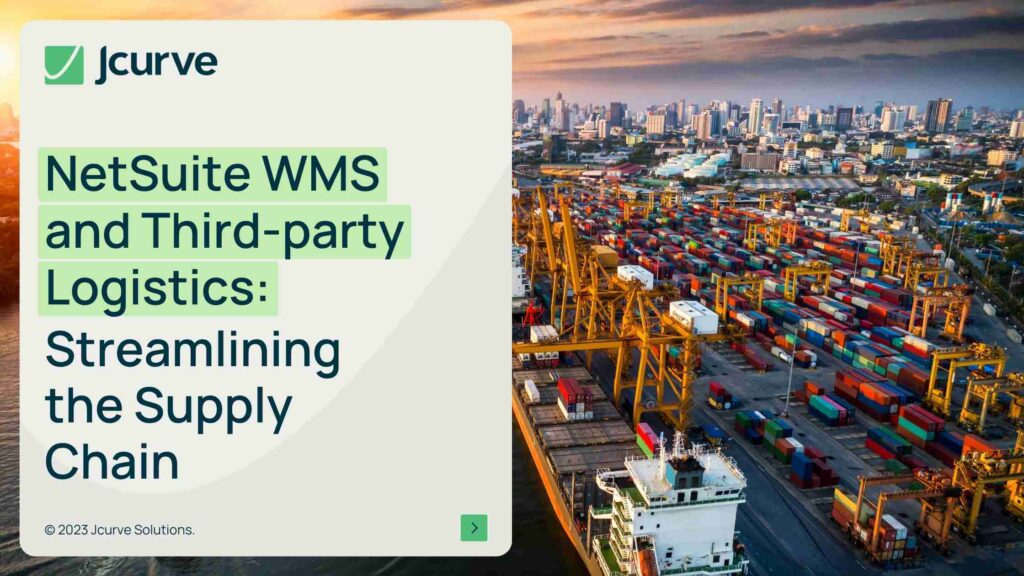Efficiency and coordination are crucial in the complex operations of supply chain management. Discover the benefits of efficient supply chain management in ‘Optimising Wholesale Distribution: The Role of Modern Warehouse Management Systems (WMS).‘
Integrating a robust Warehouse Management System (WMS) with Third-Party Logistics (3PL) providers can elevate your business’s logistical performance to new heights. NetSuite’s WMS stands out as a leading solution, promising seamless integration and real-time inventory visibility.
But how does it fare when paired with 3PL services? Let’s explore.
NetSuite WMS: Enhancing Warehousing Efficiency
NetSuite’s WMS, a component of its expansive ERP suite, is engineered to streamline warehouse operations. Learn about its scalability and flexibility in ‘Scaling Your Business? Here’s How NetSuite WMS Adapts With You‘.
Here’s what it brings to the table:
- Advanced Inventory Management: Precise tracking and handling of inventory levels.
- Efficient Picking and Packing: Optimised processes to speed up order fulfilment.
- Scalable Operations: Flexibility to grow with your business demands.
Incorporating NetSuite’s WMS can lead to significant efficiency gains within your supply chain.
The Role of Third-Party Logistics Providers (3PLs)
3PLs are the logistical lifeline for many businesses, offering:
- Outsourcing of Logistics: Handling storage, transportation and distribution.
- Expertise and Network Access: Leveraging their expertise to optimise logistics.
- Cost Savings: Reducing overheads through shared resources.
3PLs can be a game-changer, especially when their services are tightly integrated with a WMS like NetSuite’s.
Integration of NetSuite WMS with 3PLs
Can NetSuite WMS integrate with 3PLs? Absolutely. Using NetSuite’s EDI, businesses can establish a data exchange protocol that:
- Connects Seamlessly: Allows real-time communication between NetSuite and 3PL systems.
- Enhances Visibility: Provides a unified view of inventory across multiple locations.
- Streamlines Operations: Reduces manual entry and potential errors, ensuring orders are fulfilled accurately and timely.
For example, an ecommerce retailer using NetSuite WMS can seamlessly integrate with a third-party logistics (3PL) provider’s distribution centre. This integration ensures real-time, accurate online inventory levels, enhancing customer trust and satisfaction. It also streamlines order fulfilment, improving operational efficiency and delivery times. In short, integrating NetSuite WMS with a 3PL can significantly optimise an ecommerce retailer’s supply chain.
Streamlining the Supply Chain with NetSuite WMS and 3PLs
By integrating NetSuite WMS with a 3PL provider, businesses can:
- Improve Efficiency: Automated processes mean faster order processing and delivery.
- Increase Accuracy: Real-time data reduces errors in inventory and shipping.
- Optimise Costs: Better inventory management leads to reduced holding costs.
Businesses have reported significant improvements in order fulfilment times and accuracy after such integrations, showcasing the tangible benefits of this powerful duo.
Different Types of WMS and How NetSuite Fits In
When evaluating WMS solutions, it’s essential to understand the four main types:
- Standalone WMS: A specialised solution focused solely on warehouse management.
- Supply Chain Modules: Part of a larger supply chain management suite.
- ERP Integrated WMS: A WMS that is part of a broader ERP system, like NetSuite.
- Cloud-Based WMS: Hosted on the cloud, offering scalability and accessibility.
NetSuite’s WMS fits primarily into the ERP Integrated and Cloud-Based categories, providing an all-encompassing solution within NetSuite’s ERP ecosystem, perfect for businesses looking to leverage cloud technology for 3PL operations.
NetSuite as a 3PL Solution
Is NetSuite a 3PL in itself? No, but it’s a powerful ally for 3PLs. NetSuite’s WMS can amplify a 3PL’s capabilities by providing:
- Enhanced Control: Oversee your entire supply chain through a single interface.
- Greater Flexibility: Adapt to changing demands without skipping a beat.
- Robust Integration: Work in harmony with 3PL providers for smoother operations.
For more information on how NetSuite supports 3PL functions, consider exploring NetSuite’s warehouse management capabilities.
Choosing the Right WMS and 3PL Partner
Selecting the right WMS and 3PL partner is crucial. Consider:
- Scalability: Can the WMS grow with your business?
- Integration: How well does it integrate with other systems?
- Support: Does the WMS provider offer reliable support?
Evaluating NetSuite WMS for your business needs? Reach out to Jcurve for a detailed walkthrough of its features and benefits, tailored to your unique operational requirements.
Conclusion
The symbiosis between NetSuite WMS and 3PL providers is more than just a convenience; it’s a strategic advantage in the complex world of supply chain management. By harnessing the power of integration, businesses can witness enhanced efficiency, accuracy, and ultimately, customer satisfaction. If you’re considering an upgrade to your supply chain systems, integrating NetSuite WMS with a 3PL could be the leap forward your business needs.
Ready to streamline your supply chain with NetSuite WMS and expert 3PL integration? Contact Jcurve Solutions today to discover how we can transform your warehouse management processes.









